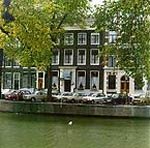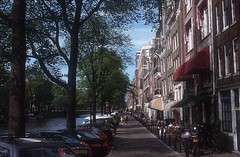caveh zahedi is a sex addict

The first time I encountered Caveh Zahedi was when I saw the Richard Linklater film Waking Life. If you haven't seen it, it's a series of animated philopsophical rants about dreaming, the meaning of life, and other stuff you used to talk about in college when you were stoned. The animation is rotoscoped from digital video, so it has a neat look to it. Caveh's scene was the most memorable for me, he's having a conversation about Andre Bazin's ideas regarding the nature of cinema. He says that film, because of its inherent specificity, is best suited to recording moments of reality. At the end of the scene, everything dissolves into clouds.
The second time I encountered Caveh was when I interviewed him for a piece I was producing about the filmmaker Jay Rosenblatt. Interviewing Caveh felt just like that scene in Waking Life -- it was like he'd hypnotized me with his big bug eyes. And when I was driving home from the interview, all I could think about was how much I loved my job.
The third time I encountered Caveh was when he invited me to be in a film he was making called I Am a Sex Addict. He needed extras for a scene he was shooting that takes place at a Sex Addicts Annonymous meeting, and he wanted me to play one of the sex addicts. I sat in a circle with 20 or so other guys in a classroom at a Presbyterian Church in Berkeley, with children's drawings on the walls behind us, as each of us improvised a monologue in front of the camera. I have no recollection of what I said.
Several years later, Caveh invited me to the screening of the completed film at the Tribecca Film Festival in New York. In my big scene, you only see me for about 3 seconds, and you can't really hear what I'm saying, you just hear Caveh's voice over. He was in town for the screening, so I thought it might be a good opportunity to interview him again, and maybe produce a piece about his work. That was one year ago, and the piece finally aired this weekend on Studio 360.
The piece explores the nature of autobiography in film, and why I think Caveh's films have successfully navigated some of the inherent pitfalls in choosing oneself as a subject matter. But I think the film is just as interesting for it's stylistic choices. He presents a blend of documentary and fiction, and the making of the film becomes sort of a subplot, but in a subtle and organic enough way that it doesn't pull me out of the film. And he mixes all kinds of media: animation, archival footage, still photography. This kind of postmodern self conciousness is certainly nothing new (see Godard et al), but it seems very much of this time. Zahedi talks about this in a recent interview for Slant Magazine.
I think what he is saying is true of radio. There's the personal documentary, which is probably most associated with This American Life, that's beginning to feel like it has run its course (it'll be interesting to see what they do with the TV show). Then there's an emerging style which is more self-concious of the medium, intricate, and non-linear. I'm thinking about work like Radio Lab, Long Haul Production's recent "Lord God Bird" piece, CBC's series The Wire, and I think my own work fits in with that as well.
I wish there were more critical thinking about radio production, like there is in film. There are a few places, like Transom and the Third Coast Festival, but they seem more geared more towards ingratiating people into the medium, and teaching them how to make radio pieces, rather than analyzing the work that's being produced in a really deep way. Professional journals seem concerned with the tools of trade and the mechanics of funding, rather than the more ambigous creative questions regarding how we are using this medium and what that might say about the way people are responding to the world. Surely there are people thinking deeply and critically about radio these days, there are very good college courses in radio that examine these very ideas. But it would be nice to have some sort of scholarly journal about radio production that could help unite us into a collective dialogue, like you see in film, music, and other art forms. Does this exist already, and if not, how can we make it happen?
The second time I encountered Caveh was when I interviewed him for a piece I was producing about the filmmaker Jay Rosenblatt. Interviewing Caveh felt just like that scene in Waking Life -- it was like he'd hypnotized me with his big bug eyes. And when I was driving home from the interview, all I could think about was how much I loved my job.
The third time I encountered Caveh was when he invited me to be in a film he was making called I Am a Sex Addict. He needed extras for a scene he was shooting that takes place at a Sex Addicts Annonymous meeting, and he wanted me to play one of the sex addicts. I sat in a circle with 20 or so other guys in a classroom at a Presbyterian Church in Berkeley, with children's drawings on the walls behind us, as each of us improvised a monologue in front of the camera. I have no recollection of what I said.
Several years later, Caveh invited me to the screening of the completed film at the Tribecca Film Festival in New York. In my big scene, you only see me for about 3 seconds, and you can't really hear what I'm saying, you just hear Caveh's voice over. He was in town for the screening, so I thought it might be a good opportunity to interview him again, and maybe produce a piece about his work. That was one year ago, and the piece finally aired this weekend on Studio 360.
The piece explores the nature of autobiography in film, and why I think Caveh's films have successfully navigated some of the inherent pitfalls in choosing oneself as a subject matter. But I think the film is just as interesting for it's stylistic choices. He presents a blend of documentary and fiction, and the making of the film becomes sort of a subplot, but in a subtle and organic enough way that it doesn't pull me out of the film. And he mixes all kinds of media: animation, archival footage, still photography. This kind of postmodern self conciousness is certainly nothing new (see Godard et al), but it seems very much of this time. Zahedi talks about this in a recent interview for Slant Magazine.
I think that the cinematic zeitgeist is not neo-realism anymore. My first films were coming out of neo-realism and an exploration of how far into the real you could go. But I thought I got as far as I could go in embracing reality, in a photographic way, with the last film, In the Bathtub of the World. There was no future there for me. I think that the zeitgeist now is the different levels of reality and the way that fiction and reality are radically intertwined. I think that hybrid films are the wave of the future. What's happening in the present at a very deep level is a very self-conscious awareness of the history of cinema, the dishonesty of mass culture, and how do you speak sincerely and intelligently within the constraints of the current culture. I think the answer to that is new and emerging. [Pause] There are two things happening. There's the personal documentary coming out of the tradition of Sherman's March, and which I think is starting to get a little tired. And there's this other strand, a playful, self-conscious strand, which you see in Charlie Kaufman movies, Run Lola Run, or Moulin Rouge. These films are very self-conscious, non-linear, and intricate aesthetically. Tarnation is a good example because it blends the intricacy with the personal. Without the intricacy the personal documentary is starting to feel tired. Without the personal the intricate feels empty.You can read the entire interview here.
I think what he is saying is true of radio. There's the personal documentary, which is probably most associated with This American Life, that's beginning to feel like it has run its course (it'll be interesting to see what they do with the TV show). Then there's an emerging style which is more self-concious of the medium, intricate, and non-linear. I'm thinking about work like Radio Lab, Long Haul Production's recent "Lord God Bird" piece, CBC's series The Wire, and I think my own work fits in with that as well.
I wish there were more critical thinking about radio production, like there is in film. There are a few places, like Transom and the Third Coast Festival, but they seem more geared more towards ingratiating people into the medium, and teaching them how to make radio pieces, rather than analyzing the work that's being produced in a really deep way. Professional journals seem concerned with the tools of trade and the mechanics of funding, rather than the more ambigous creative questions regarding how we are using this medium and what that might say about the way people are responding to the world. Surely there are people thinking deeply and critically about radio these days, there are very good college courses in radio that examine these very ideas. But it would be nice to have some sort of scholarly journal about radio production that could help unite us into a collective dialogue, like you see in film, music, and other art forms. Does this exist already, and if not, how can we make it happen?



